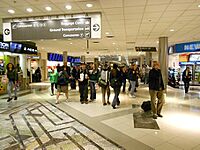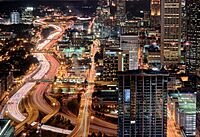Atlanta facts for kids
Quick facts for kids
Atlanta
|
|||
|---|---|---|---|
|
|
|||
|
|||
| Nicknames:
The City in a Forest, ATL, The A, Hotlanta, The Gate City, Hollywood of the South
(See also Nicknames of Atlanta) |
|||
| Motto(s):
Resurgens (Latin for Rising again, alluding to the myth of the phoenix)
|
|||
| Country | United States | ||
| State | Georgia | ||
| Counties | Fulton, DeKalb | ||
| Founded (Terminus) |
1837 | ||
| (Marthasville) | 1843 | ||
| (City of Atlanta) | December 29, 1847 | ||
| Government | |||
| • Type | Strong–mayor council | ||
| Area | |||
| • State capital | 136.31 sq mi (353.04 km2) | ||
| • Land | 135.32 sq mi (350.48 km2) | ||
| • Water | 0.99 sq mi (2.57 km2) | ||
| Elevation | 1,050 ft (320 m) | ||
| Population
(2020)
|
|||
| • State capital | 498,715 | ||
| • Estimate
(2023)
|
510,823 | ||
| • Rank | 38th in the United States 1st in Georgia |
||
| • Density | 3,685.45/sq mi (1,422.96/km2) | ||
| • Urban | 5,100,112 (US: 9th) | ||
| • Urban density | 1,997.7/sq mi (771.3/km2) | ||
| • Metro | 6,307,261 (US: 6th) | ||
| Demonym(s) | Atlantan | ||
| GDP | |||
| • Atlanta (MSA) | 5.9 billion (2022) | ||
| Time zone | UTC−5 (EST) | ||
| • Summer (DST) | UTC−4 (EDT) | ||
| ZIP Codes |
30301–30322, 30324–30329, 30331–30334, 30336-30346, 30348-30350, 30353-30364, 30366, 30368-30371, 30374-30375, 30377-30378, 30380, 30384-30385, 30388, 30392, 30394, 30396, 30398, 31106-31107, 31119, 31126, 31131, 31136, 31139, 31141, 31145-31146, 31150, 31156, 31192-31193, 31195-31196, 39901
|
||
| Area codes | 404/678/770/470/943 | ||
| FIPS code | 13-04000 | ||
| GNIS feature ID | 351615 | ||
Atlanta is the capital and largest city in the U.S. state of Georgia. It's the main city of Fulton County, and a small part of it reaches into DeKalb County. With over 510,000 people living in the city, Atlanta is the 38th largest city in the United States. The bigger Atlanta area, called Metro Atlanta, has more than 6.3 million people, making it the sixth-largest metro area in the U.S.
Atlanta is located in the Appalachian Mountains foothills, about 1,000 feet above sea level. It's known for its rolling hills, green spaces, and having the most trees of any major U.S. city.
The city started as a key point for railroads, which helped it grow quickly. Its name, "Atlanta," comes from the Western and Atlantic Railroad. During the American Civil War, it was very important for the Southern states until it was captured and mostly burned down in 1864. But Atlanta rebuilt fast and became a major industrial center. After World War II, it also became a hub for manufacturing and technology. In the 1950s and 1960s, Atlanta was a big center for the American civil rights movement, with leaders like Martin Luther King Jr. and Ralph Abernathy.
Today, Atlanta is still a major transportation hub. Hartsfield–Jackson Atlanta International Airport has been the world's busiest airport for most years since 1998. Atlanta also has a strong and varied economy, with important industries like transportation, aerospace, healthcare, film and TV production, and technology. The city gained global attention when it hosted the 1996 Summer Olympics, which helped it grow even more.
Contents
- History of Atlanta
- Geography of Atlanta
- People and Culture in Atlanta
- Atlanta's Economy
- Arts and Culture in Atlanta
- Sports in Atlanta
- Parks and Recreation in Atlanta
- Education in Atlanta
- Media in Atlanta
- Transportation in Atlanta
- Emergency Services in Atlanta
- See also
- Images for kids
- Notable people
- Sister cities
History of Atlanta
Early Beginnings and Railroads
Before Europeans arrived, the Creek Indians lived in the Atlanta area. They gave up the land in 1821, and new settlers came.
In 1836, Georgia decided to build the Western and Atlantic Railroad to connect the port of Savannah with the Midwest. The railroad's starting point, called "Terminus," became a small settlement. It was later named "Marthasville" in 1842, after the governor's daughter. The name "Atlanta" was suggested by a railroad engineer and the town officially became a city on December 29, 1847.
Civil War and Rebuilding
By 1860, Atlanta had grown to over 9,500 people. Because of its many railroads, it became a key place for distributing military supplies during the American Civil War. In 1864, the Union Army captured Atlanta. The city was almost completely burned down by General William Tecumseh Sherman before his "March to the Sea."
After the war ended in 1865, Atlanta was rebuilt. Because of its excellent railroads, the state capital moved from Milledgeville to Atlanta in 1868. By 1880, Atlanta was Georgia's largest city. People like Henry W. Grady, a newspaper editor, promoted Atlanta as a modern city of the "New South," focusing on business instead of farming. Atlanta also became a center for higher education with the founding of Georgia Tech and its historically Black colleges. In 1895, Atlanta hosted a big event called the Cotton States and International Exposition, which showed off the city's progress to the world.
Growth and Challenges in the 20th Century
Atlanta grew a lot in the early 1900s. Its population tripled, and new tall buildings changed its skyline. However, there were also tough times. In 1906, a riot caused many deaths and injuries. In 1917, a large fire destroyed nearly 2,000 buildings.
In 1939, Atlanta hosted the premiere of the famous movie Gone with the Wind. The event was a big deal, but sadly, an African American actress, Hattie McDaniel, was not allowed to attend because of segregation laws at the time.
During World War II, Atlanta played an important role with its factories and railroads, which helped the city grow even more. In the 1950s, new highways allowed people to move to the suburbs, and the city's population changed.
Civil Rights and the Olympics
In the 1960s, Atlanta was a major center for the Civil Rights Movement. Dr. Martin Luther King Jr. and other leaders from Atlanta's historically Black colleges played key roles. In 1973, Atlanta elected its first Black mayor, Maynard Jackson. Under his leadership, the airport was updated, and the city's subway system began.
Atlanta was chosen to host the 1996 Summer Olympics. This led to many new construction projects, improving the city's parks, sports venues, and transportation. The Olympics helped transform Atlanta, bringing new investments and growth.
Recent Changes
In the 2000s, Atlanta continued to change a lot. The city's population became more diverse. The BeltLine project, which turned old railroad tracks into a path with parks, has helped make the city even more vibrant. Atlanta's art scene also grew, with museums expanding and new galleries opening.
Geography of Atlanta
Atlanta covers about 136 square miles. It's located in the foothills of the Appalachian Mountains and is about 1,050 feet above sea level, making it one of the highest major cities east of the Mississippi River. Rainwater in Atlanta flows in two directions: some goes to the Atlantic Ocean, and some goes to the Gulf of Mexico. The Chattahoochee River is on the northwestern edge of the city, and much of its natural beauty is protected.
Atlanta's Cityscape
Most of Atlanta was burned during the Civil War, so many old buildings were lost. However, Atlanta has always been a city focused on railroads and business, so its buildings often look similar to those in other parts of the U.S.
In the 1970s and 80s, Atlanta built many modern skyscrapers. Later, in the late 1980s and early 1990s, new buildings like the Bank of America Plaza (Atlanta's tallest building) added classical designs. The Fox Theatre, a beautiful old building, was saved by people who wanted to protect its history.
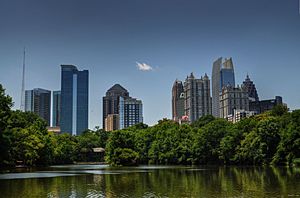
Atlanta is divided into many neighborhoods. It has three main high-rise areas along Peachtree: Downtown, Midtown, and Buckhead.
- Downtown Atlanta has many offices, especially for the government. It's also home to sports venues and tourist spots.
- Midtown Atlanta is the second-largest business area and is known for its art centers, cultural attractions, and universities.
- Buckhead is north of Downtown and is the third-largest business area. It has an urban center surrounded by leafy neighborhoods with single-family homes.
Around these busy areas are quieter neighborhoods, often with craftsman bungalow homes. The east side has historic neighborhoods like Inman Park and the Old Fourth Ward. On the west side, old factories have been turned into new homes, shops, and art galleries.
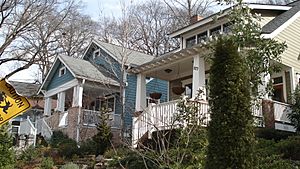
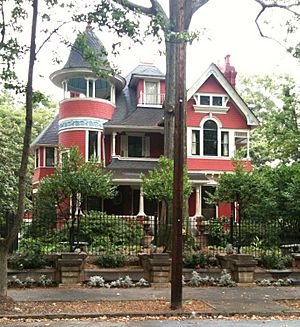
Atlanta's Climate
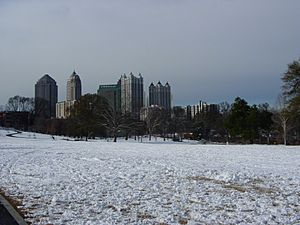
Atlanta has a humid subtropical climate, meaning it has four clear seasons and gets a good amount of rain all year. Summers are hot and humid, but the city's elevation helps a little. Winters are cool but can change a lot. It freezes about 48 days a year, but temperatures rarely drop below 0°F (−18°C).
July is the warmest month, averaging around 80°F (27°C). Temperatures can reach 90°F (32°C) about 44 days a year. January is the coolest, averaging about 43°F (6°C). Snowfall is usually light, about 2 inches per year. Ice storms can sometimes cause more problems than snow. Tornadoes are rare in the city itself.
People and Culture in Atlanta
Atlanta's Population
| Historical population | |||
|---|---|---|---|
| Census | Pop. | %± | |
| 1850 | 2,572 | — | |
| 1860 | 9,554 | 271.5% | |
| 1870 | 21,789 | 128.1% | |
| 1880 | 37,409 | 71.7% | |
| 1890 | 65,533 | 75.2% | |
| 1900 | 89,872 | 37.1% | |
| 1910 | 154,839 | 72.3% | |
| 1920 | 200,616 | 29.6% | |
| 1930 | 270,366 | 34.8% | |
| 1940 | 302,288 | 11.8% | |
| 1950 | 331,314 | 9.6% | |
| 1960 | 487,455 | 47.1% | |
| 1970 | 495,039 | 1.6% | |
| 1980 | 425,022 | −14.1% | |
| 1990 | 394,017 | −7.3% | |
| 2000 | 416,474 | 5.7% | |
| 2010 | 420,003 | 0.8% | |
| 2020 | 498,715 | 18.7% | |
| 2023 (est.) | 510,823 | 21.6% | |
| U.S. Decennial Census 1850–1870 1870–1880 1890–1910 1920–1930 1940 1950 1960 1970 1980 1990 2000 2010 2020 |
|||
Atlanta's population was 498,715 in 2020. The city is very diverse. In 2020, about 47% of the population was Black or African American, and 38.5% was non-Hispanic White. About 6% of the population was Hispanic or Latino, and 4.5% was Asian.
Atlanta has long been known as a center for African-American culture, education, and business. In recent years, many people from different countries have moved to Atlanta, making it even more diverse. There are growing communities of people from India, China, South Korea, Mexico, and many other places.
Religion in Atlanta
Atlanta has many different faiths because of its diverse population. Most residents are Christian, with many Protestant churches and a growing number of Roman Catholic churches. There are also many other faiths, including Judaism, Islam, and Hinduism.
Atlanta's Economy
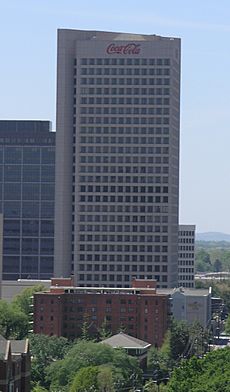
The Atlanta area has a very large economy, one of the biggest in the U.S. and the world. Many big companies have their main offices in Atlanta, such as The Coca-Cola Company, The Home Depot, Delta Air Lines, and UPS. Over 75% of the largest U.S. companies have operations in the Atlanta area. Many companies choose Atlanta because it has a well-educated workforce.
Transportation is a huge part of Atlanta's economy. Hartsfield–Jackson Atlanta International Airport is the world's busiest airport, and Delta Air Lines has its largest hub there. Major freight railroads like Norfolk Southern Railway also have important operations in the city.
Media is another big industry. Ted Turner started CNN and other TV networks in Atlanta. Cox Enterprises, a large cable TV and newspaper company, is also based here. Atlanta is also a major center for film and television production, earning it the nickname "Hollywood of the South." Many movies and TV shows are filmed in Atlanta because Georgia offers tax credits for productions.
Technology is growing fast in Atlanta, which is sometimes called "Silicon peach" because of all the tech jobs. The city has one of the largest numbers of IT jobs in the U.S.
Arts and Culture in Atlanta
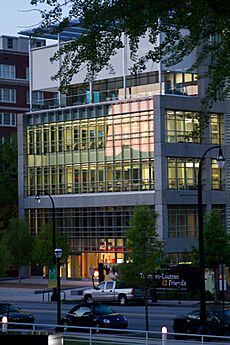
Atlanta is a cultural hub with a mix of influences from all over the U.S. and the world. This can be seen in its art districts, unique neighborhoods, and diverse food scene.
Arts and Theater
Atlanta has professional companies for opera (Atlanta Opera), ballet (Atlanta Ballet), orchestral music (Atlanta Symphony Orchestra), and theater (Alliance Theatre). The Woodruff Arts Center in Midtown is a major arts hub. The historic Fox Theatre often hosts touring Broadway shows and concerts.
The city has many important art museums. The High Museum of Art is one of the best in the South. The Museum of Design Atlanta (MODA) focuses on design. There are also museums for contemporary art and ancient art, like the Michael C. Carlos Museum at Emory University. Atlanta is also known for its vibrant street art scene.
Music Scene
Atlanta has played a big role in many types of American music. In the 1920s, it was a center for country music. In the 1960s, it hosted the Atlanta International Pop Festival. The city was also important for Southern rock in the 1970s.
In the 1990s, Atlanta produced many famous music artists in R&B and country. It also became the birthplace of Atlanta hip hop, with groups like Outkast becoming very popular. Today, Atlanta is a major center for hip-hop music. The city also has a lively indie rock scene.
Film and Television Production
Atlanta is a top city for film and television production in the U.S. and globally. It's home to major studios like Tyler Perry Studios. Many blockbuster movies and TV shows are filmed in Atlanta, often using the city as a stand-in for other places. Some movies and shows are actually set in Atlanta, like Gone With the Wind and The Walking Dead.
Popular TV Shows Filmed in Atlanta
- Ozark
- Watchmen
- The Walking Dead
- Stranger Things
- Love Is Blind
- Atlanta
Festivals and Events
Atlanta has many festivals throughout the year, more than any other city in the southeastern U.S. Some popular ones include the Atlanta Dogwood Festival, Shaky Knees Music Festival, Dragon Con, the Peachtree Road Race, and Music Midtown.
Tourism and Attractions
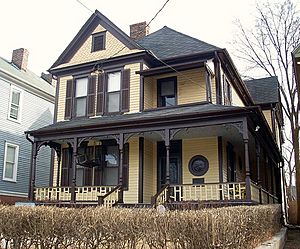
Atlanta is one of the most visited cities in the U.S., with over 35 million visitors each year. The most popular attraction is the Georgia Aquarium, one of the largest indoor aquariums in the world.
Atlanta also has many historical museums and sites:
- The Martin Luther King Jr. National Historical Park: You can see Dr. Martin Luther King Jr.'s childhood home and his final resting place.
- The World of Coca-Cola: Learn about the history of the famous soft drink.
- The College Football Hall of Fame: Celebrates college football and its players.
- The National Center for Civil and Human Rights: Explores the civil rights movement.
- The Carter Center and Presidential Library: Houses papers and items related to U.S. President Jimmy Carter.
- The Margaret Mitchell House and Museum: Where Margaret Mitchell wrote Gone with the Wind.
For outdoor fun, visitors can go to the Atlanta Botanical Garden, which has a unique "Canopy Walk" that lets you walk among the treetops. Zoo Atlanta is home to over 1,300 animals, including giant pandas.
Atlanta's food scene is also a big draw, with everything from fancy restaurants to international eateries along Buford Highway. For traditional Southern food, check out The Varsity, the world's largest drive-in restaurant.
Cuisine in Atlanta
Atlanta is famous for its barbecue, hamburgers, Southern fried chicken, and lemon pepper wings. Along Buford Highway, you can find many different kinds of international foods, especially Mexican and Asian dishes.
Sports in Atlanta
Sports are a big part of Atlanta's culture. The city has professional teams in four major sports:
- The Atlanta Braves for Major League Baseball. They are one of the oldest sports teams in the U.S. and have won the World Series four times. They play at Truist Park.
- The Atlanta Hawks for the National Basketball Association. They play at State Farm Arena.
- The Atlanta Falcons for the National Football League. They play at Mercedes-Benz Stadium.
- Atlanta United FC for Major League Soccer. They won the MLS Cup in 2018 and have a very passionate fan base.
Atlanta is also known as the "capital" of college football. It's home to the Georgia Tech Yellow Jackets football and the Georgia State Panthers. The city hosts many big college football events every year, including the SEC Championship Game and the Peach Bowl.
Atlanta has also hosted many major sporting events, including the 1996 Summer Olympics and the Super Bowl three times. The city hosts the Peachtree Road Race every Independence Day, which is the world's largest 10K race.
Parks and Recreation in Atlanta
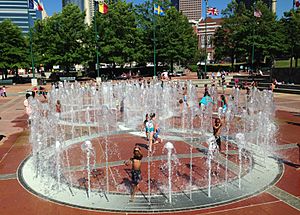
Atlanta has 343 parks, nature preserves, and gardens. About 77% of people in Atlanta live within a 10-minute walk of a park. Piedmont Park in Midtown is Atlanta's most famous green space, hosting many events. Westside Park, which opened in 2021, is the city's largest park.
Other notable parks include:
- Centennial Olympic Park: A legacy from the 1996 Olympics, located in the tourist area.
- Woodruff Park: Part of the Georgia State University campus.
- Grant Park: Home to Zoo Atlanta.
- Chastain Park: Has an amphitheater for concerts.
The Chattahoochee River National Recreation Area protects a long stretch of the river for outdoor activities like kayaking and fishing. The Atlanta Botanical Garden has beautiful gardens and a "Kendeda Canopy Walk" that lets you walk 40 feet above an urban forest. The BeltLine, a former rail line, has been turned into a series of parks and trails that loop around the city.
Atlanta also has public golf courses, tennis courts, and a skate park.
Atlanta's Tree Canopy
Atlanta is often called a "city in a forest" because it has so many trees. Beyond the main business districts, the city is covered in a dense canopy of trees. This is true: about 48% of the city is covered in vegetation, which is the highest among major American cities. The city even has an annual Atlanta Dogwood Festival when the dogwood trees bloom.
These trees help clean the air and cool the city. However, they are threatened by heavy rains, droughts, pests, and new construction. Groups like Trees Atlanta and the city government are working to protect and plant more trees.
Education in Atlanta
Atlanta is a major center for higher education, with more than 15 colleges and universities.
Colleges and Universities
- The Georgia Institute of Technology (Georgia Tech) in Midtown is a top public research university known for engineering and science.
- Georgia State University in Downtown is a large public research university.
- Emory University is a well-known private university with a leading healthcare system.
- The Atlanta University Center is the largest group of historically Black colleges in the U.S. It includes Spelman College, Clark Atlanta University, and Morehouse College.
- The Savannah College of Art and Design (SCAD) has a campus in Atlanta, contributing to the city's art scene.
- Atlanta also has several law schools.
Schools for Younger Students
Atlanta Public Schools (APS) serves about 49,000 students in 106 schools. There are also many private schools in Atlanta, including Atlanta International School and The Westminster Schools.
Media in Atlanta
Atlanta has several major TV stations for networks like NBC, CBS, ABC, and Fox. It also has public television and radio stations.
The main daily newspaper is The Atlanta Journal-Constitution. There are also other newspapers and magazines, including Creative Loafing and Atlanta Daily World, which is one of the oldest Black newspapers in American history.
Transportation in Atlanta
Atlanta has a large transportation system, including highways, a subway, buses, and the world's busiest airport.
Atlanta has many highways that spread out from the city. Three major interstate highways meet in Atlanta: I-20, I-75, and I-85. I-75 and I-85 combine in the middle of the city to form the Downtown Connector, which is one of the busiest highways in the U.S. Atlanta is also surrounded by Interstate 285, known as "the Perimeter." Because many people drive cars, Atlanta can have a lot of traffic.
The Metropolitan Atlanta Rapid Transit Authority (MARTA) provides public transportation with buses and a subway system. The subway connects important places like the airport, Downtown, Midtown, and Buckhead. In 2014, the Atlanta Streetcar opened, running a loop around downtown tourist areas.
Hartsfield–Jackson Atlanta International Airport is the world's busiest airport for passengers and flights. It offers flights to over 150 U.S. cities and more than 75 international places. Delta Air Lines has its largest hub at this airport.
Cycling is also growing in Atlanta. The city plans to build many miles of bike lanes, with the BeltLine helping to connect them. Electric scooters are also popular for getting around the city.
Emergency Services in Atlanta
The Atlanta Police Department (APD) helps keep the city safe. The Atlanta Fire Rescue Department provides fire protection and emergency medical services. Emergency ambulance services are provided by Grady EMS and American Medical Response.
Atlanta has stated it is a "welcoming city" for everyone.
See also
 In Spanish: Atlanta para niños
In Spanish: Atlanta para niños
Images for kids
Notable people
Sister cities
Atlanta has many sister cities around the world, which helps build friendships and understanding between different cultures:
- Montego Bay, Jamaica (1972)
- Rio de Janeiro, Brazil (1972)
- Lagos, Nigeria (1974)
- Toulouse, France (1974)
- Newcastle upon Tyne, England, UK (1977)
- Taipei, Taiwan (1979)
- Daegu, South Korea (1981)
- Brussels, Belgium (1983)
- Port of Spain, Trinidad and Tobago (1987)
- Tbilisi, Georgia (1988)
- Olympia, Greece (1994)
- Bucharest, Romania (1994)
- Cotonou, Benin (1995)
- Salcedo, Dominican Republic (1996)
- Torrejon de Ardoz, Spain (1996)
- Nuremberg, Germany (1998)
- Ra'anana, Israel (2000)
- Addis Ababa, Ethiopia (2004)
- Fukuoka, Japan (2005)
- Sassari, Italy (2020)


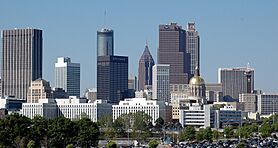


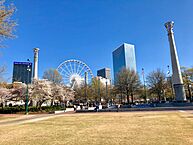

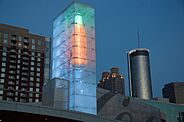



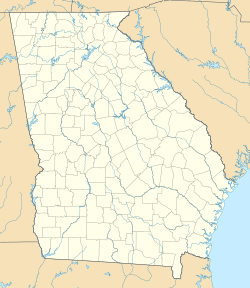

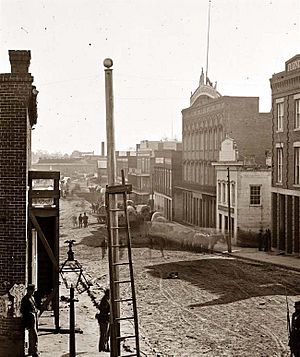
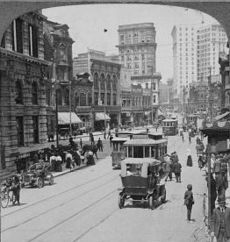
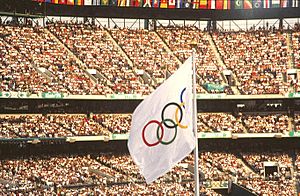

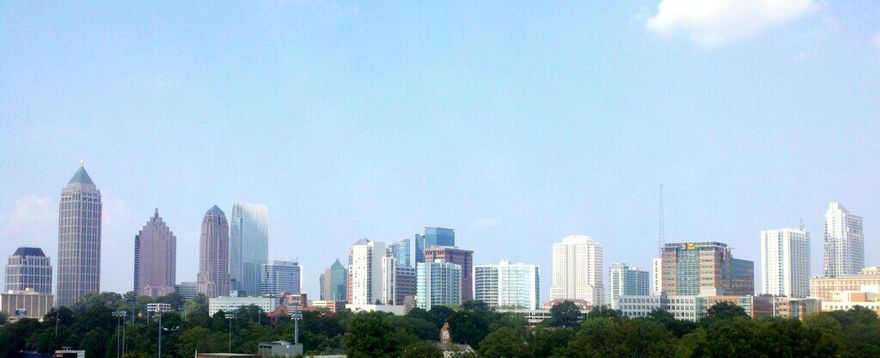

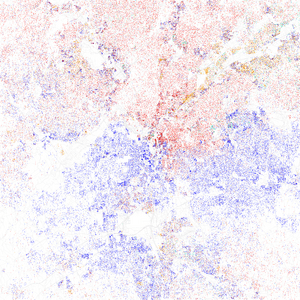
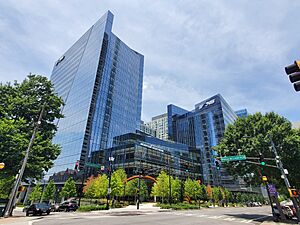
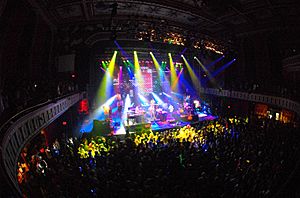
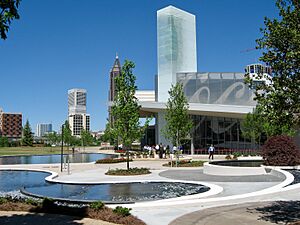
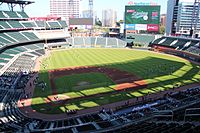
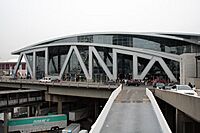
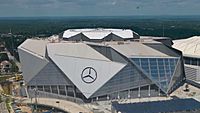
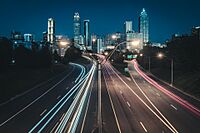
![The [[Metropolitan Atlanta Rapid Transit Authority] serves the city.](/images/thumb/f/f4/Marta_Rail_Breda.jpg/200px-Marta_Rail_Breda.jpg)
